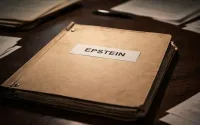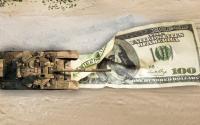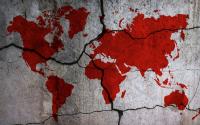12 May 2010
by Max Ajl
That Thursday morning was odd weather in Gaza. Gaza is pretty arid. Thick cloud cover is unusual in late April, so is rain. The slate storm-front sliding over the horizon in Farraheen was even weirder. We were in Abasan Kabeera, on the farmland of the Tabash family. Peasant women picked the golden bunches of lentils from the ground swiftly underneath the quickly darkening sky, pulling neat bundles of stalks and beans from the earth with practiced motions, quick, smooth grabs, and leaving them on their side in the newly-bare dirt. Six women and two men cooperated to harvest the six dunums or so of lentils growing in that sector of the field, as we watched over them.
They were in the nebulously defined "buffer zone," a morphing, stretching and shrinking swathe of land on Gaza's borders with Israel. The zone morphs because, according to the acknowledged on all sides as defunct Oslo Accords, a 50-meter buffer zone was legal. Last winter, Israel began attempting to enforce an 800-meter, no-go zone, a tremendous intrusion into Gaza's sovereign land space, lopping off maybe 10 percent of Gaza's already atrophied area. Peasants do farm there anyway, or try to. They plant crops, and frequently watch them get pulverized, or watch the plants and the soil they sit in get upturned, or watch trees get uprooted.
Or farmers try to plant seeds there, and instead of demolishing vegetation, the Israeli Army kills cultivators, lancing them from hundreds of meters away with sniper shots to their heads and necks. Many die this way, according to the major human rights organizations in the Gaza Strip.
We were there to escort them as they harvested their crops. The thinking is that the Israel Defense Forces (IDF) is less likely to kill peasants cultivating their crops in the presence of international witnesses. The thing is, when the thinking is right, you don't know that it's right, because no one gets shot, and that particular silence doesn't speak. Sometimes, the thinking is wrong. Palestinian peasants have died when accompanied by internationals. And internationals have been blasted as they accompanied peasants, or at demonstrations. Bianca Zammit, a 28-year old Maltese human rights activist, was almost hamstrung by a deliberately aimed sniper bullet that pierced her upper thigh on April 24.
The peasants harvested their lentils, putting them in a clean-looking, gold and green heap in a small field planted with meter-high olive tree saplings. The saplings don't bear fruit for at least three years. But perennials and vegetables are quicker growing crops. The olive saplings, so close to the swelling, shifting buffer zone, were a bit of a gamble. Their owners would have to wait three years to garner a return from their time, hoping that the Israeli Army won't in the interim shatter them to pieces.
Further out, and abutting the lentil fields, were wide cuts of rye and winter wheat, crops that don't need to be attended much. That's why they are planted there. Peasants don't want to regularly foray into land in which they will be shot. The wheat was desiccated, the result of a winter largely without rain. The lentils were doing a little better, but still with a lot of husk and not so much seed. They would eat the seed, and use the husk for fodder for their animals. As Nidaa abu al Atta of the Palestinian Agricultural Relief Committees told me, "They cultivate the wheat just to say that we are not going to abandon our land." Entering the mindset of a farmer, she said, "I feed my animals with it. I use some of it for my personal use. Wheat is available for everyone in Gaza." Planting it is "a kind of resistance."
Just over the other edge of the Israel border, we occasionally saw odd protuberances. The tops of bushes or trees, or some vehicle maybe. We couldn't see well. After the lentils of the Tabash family were harvested, we went to the home of Jaber abu-Rjila and his wife, Layla abu-Dagga, and drank sweet Palestinian tea with homemade, biscotti-like sugary biscuits. Vittorio Arrigoni wandered onto the roof to play with their son. He quickly beckoned us all up, as he looked over at the Israeli border.
There were a number of colossal, metal shapes visible on the border. What had been identifiable earlier only as odd protrusions were coming into focus. They were military vehicles: armored bulldozers, the drivers screened in by metal barriers; Merkava tanks; and jeeps. The Israeli Army was planning an incursion into Gaza, a routine sweep of the buffer zone. Such sweeps occur in 50-meter wide belts once a month, or more frequently, depending on the caprice of the Israeli Army. We watched dumbstruck as tremendous bulldozers razed winter wheat that was mostly husk, useful only as animal fodder, to the ground, churning up the earth in tremendous ugly swells in front of their blades. Patches of rye and lentils, the desperate attempts of the Tabash family to plant something in the buffer zone, leveled in an ugly tableau. Jaber told us that when the bulldozers turn the earth that way, they damage its fertility in the future, too, because the surface layer of soil is humus, chock-full of nutrients, minerals, organic matter. The lower layers of soil are less fertile. So, subsequent harvests are less fruitful.
We left the roof to continue to watch the destruction of the wheat from ground level. Eva Bartlett, an ISM activist, pointed out that "they might destroy the house in punishment" if we didn't leave and observe from a different position. They might also have considered sending an Apache rapidly over the horizon to kidnap us. Abductions of foreign internationals have happened before - Vittorio had been kidnapped off a fishing boat, in Gazan territorial waters, in November 2008.
After the Israeli Army passed through the area, we walked through the streets, getting ready to go. On our way, we passed a very small boy and his brother, even smaller, hiding behind a row of trees off of the main road. They had seen us from a distance. They were visibly shaking. The older one was Amir; he was maybe four, the littler one, probably three. Amir looked like he had been crying. They would not say hello to us, and cowered behind their mother. She explained it was because of our backpacks. The only foreigners with backpacks Amir and his brother in rural Farraheen had ever seen were Israeli soldiers coming to destroy homes, shooting and killing and devastating. Because of our backpacks, they thought we, too, were soldiers. Because of the Israeli Army, these little children are terrified of people from the outside world, because all they know of such people is that they are trying to destroy their world.






